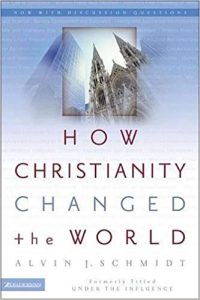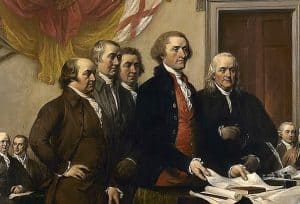Remember the “Parable of the Talents” in the New Testament? Christ exhorts us to be the best we can be by developing our skills and abilities, by succeeding in all our tasks and endeavors. What better description can there be of capitalism?
—Margaret Thatcher—
Key point: God’s fingerprints are all over the free enterprise economic model many people call capitalism.
Parts 2 and 3 of this series are available on one page here.
Title: “Ten Ways the Free Enterprise Economic Model Aligns with Scripture”
 Last time, with these definitions of key terms in mind, we closed with these important insights from Christian author, sociologist, historian, and cultural observer Alvin J. Schmidt:
Last time, with these definitions of key terms in mind, we closed with these important insights from Christian author, sociologist, historian, and cultural observer Alvin J. Schmidt:
Just as God does not want people to be coerced in spiritual matters, so too he does not want them to be coerced in earthly matters, for instance, in their economic activities. There is not a single reference in either the Old or New Testament in which God denies economic freedom to people, as in fascism, socialism, and communism (emphasis added).1
There is not a single reference in either the Old or New Testament in which God denies economic freedom to people, as in fascism, socialism, and communism.
—Dr. Alvin J. Schmidt—
In this post and the next (and possibly beyond that), we’ll explore some of the qualities that mark the freedom God wants people to have in the economic arena—both from individual and societal, or corporate, perspectives. Is the free enterprise economic model compatible with biblical teachings? Any objective observer will answer this question with a resounding yes!
The Freedom Upon Which the Free Market Depends Is Biblical
The following paragraph appears in an article posted on the Summit Ministries website and titled “Socialism, Capitalism, and the Bible.” It debuted in 1985 in Imprimis, a publication of Hillsdale College. The paragraph provides an excellent guide for us to follow as we explore the compatibility between biblical teachings and a free market economic model.

Capitalism is not economic anarchy. It recognizes several necessary conditions for the kinds of voluntary relationships it recommends. One of these presuppositions is the existence of inherent human rights, such as the right to make decisions, the right to be free, the right to hold property, and the right to exchange what one owns for something else. Capitalism also presupposes a system of morality. Capitalism should be thought of as a system of voluntary relationships within a framework of laws which protect peoples’ rights against force, fraud, theft, and violations of contracts. “Thou shalt not steal” and “Thou shalt not lie” are part of the underlying moral constraints of the system. Economic exchanges can hardly be voluntary if one participant is coerced, deceived, defrauded, or robbed.
Dr. Ronald Nash, the author of the article, has succinctly summarized the human freedom that is both 1) a benefit of a free enterprise market economy and 2) a component upon which it depends.
Significantly, in this paragraph, Nash cites several biblical tenets that, by its very nature, a free market upholds.
First, he notes, “Capitalism is not anarchy.” This is vitally important for Christians to understand. The freedom of free enterprise isn’t random or chaotic, but purposeful and ordered—and it is ordered in a manner that gives people freedom to pursue their interests, develop their skills, use their talents, find satisfaction, and yes, even change their minds. Moreover, the free market model fits well with and can operate smoothly alongside government, whose leaders
Romans 13:3 are not a terror to good works, but to evil. Do you want to be unafraid of the authority? Do what is good, and you will have praise from the same. 4 For he is God’s minister to you for good. But if you do evil, be afraid; for he does not bear the sword in vain; for he is God’s minister, an avenger to execute wrath on him who practices evil.

The apostle Peter echoed what Paul said in Romans 13. Agents of the government “are sent…for the punishment of evildoers and for the praise of those who do good.” And as Paul directed Timothy in 1 Timothy 2:1-2, “I exhort first of all that supplications, prayers, intercessions, and giving of thanks be made for all men, for kings and all who are in authority, that we may lead a quiet and peaceable life in all godliness and reverence.” The order the government is divinely assigned to maintain is part of the stable environment necessary in a productive free market economy.
We are emphasizing here that capitalism allows people to act freely and strategically to work, produce, and profit from their labors. In themselves, these actions are neither sinful nor illegal. They actually are good, although sinful humanity, of course, can distort and misuse good gifts, opportunities, and resources. Even so, in Deuteronomy 8:18, Moses told the Israelites, “[Y]ou shall remember the Lord your God, for it is He who gives you power to get wealth, that He may establish His covenant which He swore to your fathers, as it is this day.”
And you shall remember the Lord your God, for it is He who gives you power to get wealth, that He may establish His covenant which He swore to your fathers, as it is this day.
—Moses to the Israelites in Deuteronomy 8:18—

Working for profit, therefore, isn’t inherently wrong. Working to benefit oneself isn’t necessarily a manifestation of greed. It can represent, and usually does, accepting the mantle of responsibility, acting so as not to have to rely on society or other individuals for basic needs. Margaret Thatcher said, “We need to create a mood where it is everywhere thought morally right for as many people as possible to acquire capital.” The beauty of a free enterprise economy is that when the worker, the supervisor, the manager, the entrepreneur, and the CEO voluntarily do their jobs well, they’re not the only ones who benefit. Others—people who use their company’s services and/or products—benefit as well. None of this activity is disruptive, nor is any of it forced. And all of it contributes to order, stability, and progress in society.
We need to create a mood where it is everywhere thought morally right for as many people as possible to acquire capital.
—Margaret Thatcher—
Second, Nash observes that capitalism “recognizes several necessary conditions for the kinds of voluntary relationships it recommends.” Do not miss that the “relationships it [capitalism] recommends” are voluntary. People participate as they wish, not as they are coerced. Remember the observations we cited at the outset from Dr. Alvin Schmidt:
Just as God does not want people to be coerced in spiritual matters, so too he does not want them to be coerced in earthly matters, for instance, in their economic activities. There is not a single reference in either the Old or New Testament in which God denies economic freedom to people, as in fascism, socialism, and communism (emphasis added).2

Have you stopped to consider this freedom and what your life would be like without it? How valuable is this freedom to you? No, you can’t do absolutely everything you may want to do. Certain limitations, such as not having enough money to buy your first-choice car or computer, prevent you from taking first-choice actions. Yet within the free market economy, you are the one in charge! You can work to reduce your limitations! One day, that car won’t be so far out of reach! Risk is involved, of course. You may not succeed. Yet, if government intervened to ensure your success, it also would limit your freedom and prevent you from reaching your fullest potential.
Elsewhere in his article, Dr. Nash writes about what he calls “interventionism.” He describes it as a “hybrid” between socialism and capitalism. Elaborating, he says,
One dominant feature of capitalism is economic freedom, the right of people to exchange things voluntarily, free from force, fraud, and theft. Socialism, on the other hand, seeks to replace the freedom of the market with a group of central planners who exercise control over essential market functions. There are degrees of socialism as there are degrees of capitalism in the real world. But basic to any form of socialism is distrust of or contempt for the market process and the desire to replace the freedom of the market with some form of centralized control. Generally speaking, as one moves along the continuum of socialism to capitalism, one finds the following: the more freedom a socialist allows, the closer his position is to interventionism; the more freedom an interventionist allows, the closer his position is to capitalism. The crux is the extent to which human beings will be permitted to exercise their own choices in the economic sphere of life.
In other words, regardless of intentions, the greater the intervention to control the economy centrally, the less freedom people have. Nash continues, saying interventionism is “a hopeless attempt to stop on a slippery slope where no stop is possible.” Typically when a free market experiences hiccups or bumps in the road, the market can and will correct itself—if it is allowed to do so.

Third, one of the conditions Nash cites for the free market to operate well is “the existence of inherent human rights,” or “unalienable Rights,” as the Declaration of Independence calls them. As Americans, we recognize that this tenet is one of or country’s founding principles. Further, as Christians, we believe this principle is biblical. When God created human beings, He made them in His image. This affirms the dignity of every human being and an individual’s personal sovereignty within reality’s limits and the limits of God’s law. This also means people have the specific rights Nash goes on to name. We’ll begin looking at those momentarily, when we consider the fifth item.
Fourth, it is no coincidence that in Genesis 1:26-28, in the very context of describing how human beings are God’s highest creation, the inspired writer says, “God blessed them, and God said to them, ‘Be fruitful and multiply; fill the earth and subdue it; have dominion over the fish of the sea, over the birds of the air, and over every living thing that moves on the earth’” (v. 28). This divine command often has been called the cultural commission. Not accidentally, it can be best fulfilled, by Christians and non-Christians alike, in the context of a free market economy.
Fifth, people have “the right to make decisions.” This principle, as we have seen so clearly already, is thoroughly biblical. While Scripture encourages people to make wise decisions, and while some decisions have adverse consequences and others have beneficial ones, people ultimately are free to act as they wish. In these nine Bible passages, readers are encouraged, commanded, and warned to work diligently and well, to avoid laziness, and to act responsibly overall. In these seven parables of Jesus, we not only observe economic activity within the context of a free market economy, but we also see expectations placed on workers and managers consistent with those employed in a free economic framework. Technically, throughout Scripture, the free market economic structure isn’t recommended; it is assumed. With this assumption, Scripture upholds the free market model over all others in the strongest possible way.

Sixth, Nash acknowledges that “the right to be free” is essential to a free market economy. Significantly, in Matthew 20:15, in the parable of the vineyard workers, Jesus indicated the hiring landowner asked an important rhetorical question: “Is it not lawful for me to do what I wish with my own things?” This, too, assumes a free enterprise approach. Also in the same parable, workers who were hired were free to work for the wages offered or to turn down the landowner’s offer to hire them, as they wished. Once they agreed to do so, they were obligated; but they were obligated, not by force, but by their own choices and agreements.
Is it not lawful for me to do what I wish with my own things?
—Jesus in Matthew 20:15, relating the words of the hiring landowner in the parable of the vineyard workers—
Stepping Back
Let’s review. Up to this point, we’ve considered six elements that tie the free enterprise market model to biblical teachings. They are as follows.
-
- Capitalism is maintained in the context of an ordered freedom that Scripture upholds and makes possible.
- The voluntary involvement of individuals that makes capitalism work is antithetical to government orchestration of private decisions and actions. Scripture affirms personal freedom in the economic realm.
- A free enterprise economic model rests on the principle that individuals have inherent rights consistent with their having been created by God “in His image.”
- In the context of a free market economy, workers and supervisors, buyers and sellers, producers and consumers—all who participate—can act to fulfill the cultural commission God gave the human race in Genesis 1:28.
- Both capitalism and Scripture affirm the individual sovereignty of human beings, including “the right to make decisions.”
- “The right to be free” is an integral part of free enterprise—and a right upheld in God’s Word.
Six down, and four to go! Be sure to return next time, when we will explore some additional rights, as well as the critical need for moral guidelines and the boundaries they establish. We’ll continue to see that, contrary to popular thinking (even in some instances in the church), capitalism and Scripture fit together beautifully.
Part 3 is available here.
Copyright 2020 by B. Nathaniel Sullivan. All rights reserved.
top image credit: Photo by Rod Long on Unsplash
Unless otherwise indicated, Scripture has been taken from the New King James Version®. Copyright © 1982 by Thomas Nelson, Inc. Used by permission. All rights reserved.
Notes:
1Alvin J. Schmidt, How Christianity Changed the World, (Grand Rapids: Zondervan, 2004), 205.
2Schmidt.

Be First to Comment